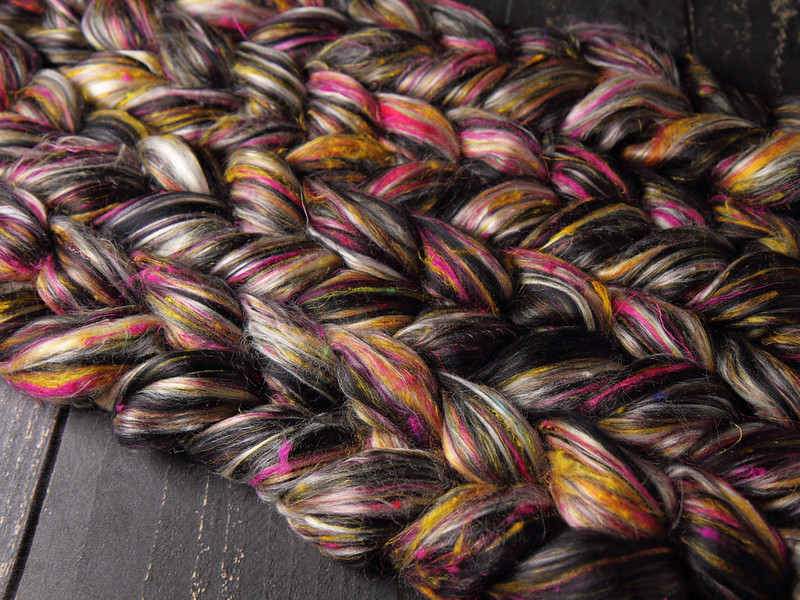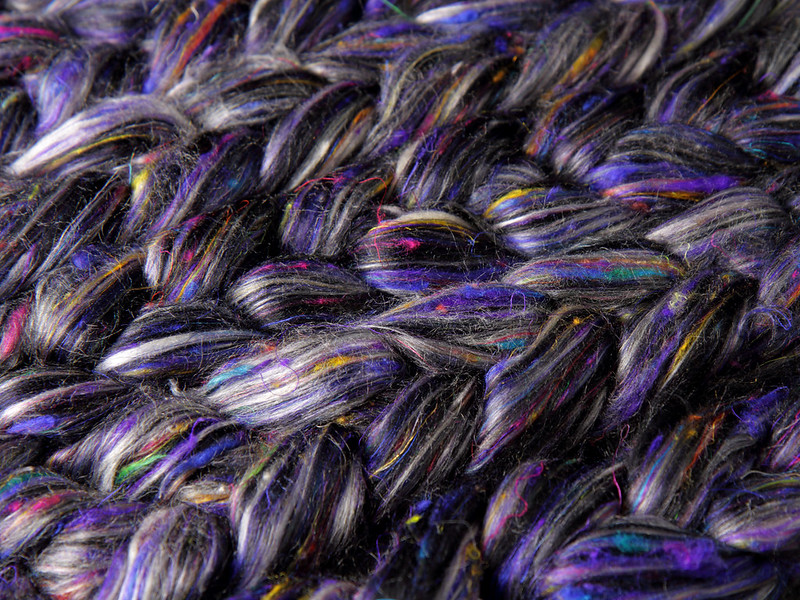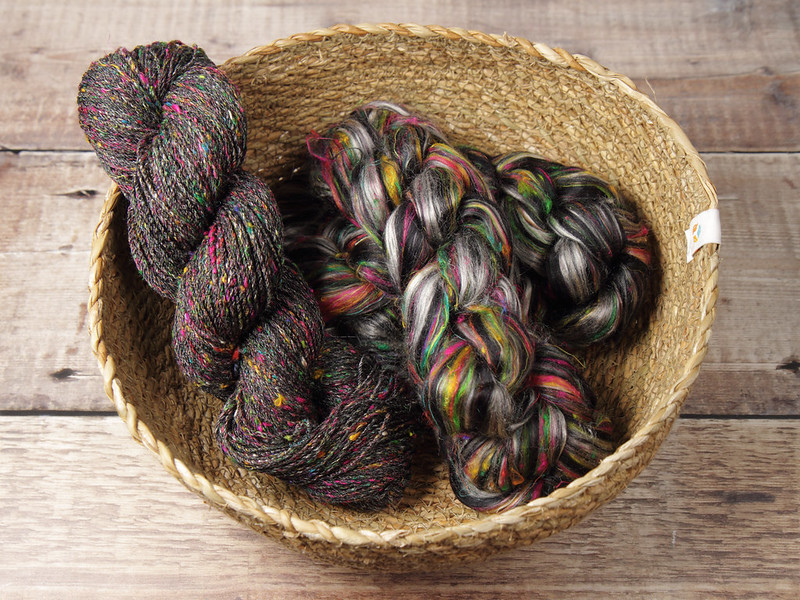Our newest fibre is a tweedy blend with sustainability at its heart.
Like many of the best inventions, Karma Blend was born out of a particular quandary. It had been bothering me for some time that fibre marketed explicitly as vegan, like faux cashmere and faux angora, is normally plastic. At the same time, I have been missing the glittery effect fibres I loved so much after giving them up because of their environmental impact.
I wondered if there was a way to bring some of the interest of effect fibres into spinning without plastics, an alternative to animal fibres could exist that is both biodegradable and similar in feel to the synthetic options.
Of course, many plant-based fibres that are vegan-friendly and sustainable, such as linen and ramie, have existed for millennia. They may well be just the thing for some projects, but personally, I don’t enjoy working with them. They’re not well suited to making the kinds of yarn I want to use, whether it’s because of their coarseness and stiffness or because they’re harder to draft.
Thankfully, a vast array of fibres have come onto the market recently, and I set about trying them out in order to create a blend with the characteristics I was looking for.
Karma Blend is the result! The blend is 50% bamboo, 25% mint and 25% recycled sari silk.
The fibres
Bamboo fibre has a soft, smooth feel, a glossy appearance and natural drape. It’s similar to silk, but with a shorter and more consistent staple length of around 70mm (compared to 150-250mm for Mulberry silk). It is absorbent and has antibacterial properties, making it pleasant to wear.
There are several reasons why this fibre has strong eco-credentials: It is water-efficient to grow and rapidly regenerates from the same rootstock. It is harvested without disturbing the soil. It is fully compostable.
The bamboo we use is turned into spinnable fibre using a closed-loop process (which means that the chemicals are extracted and recycled back into the system) and is OEKO-TEX 100 certified.
Mint fibre is a relatively new-to-market cellulose fibre. Of all those we trialled, we found it to have the loveliest feel thanks to its incredibly fine fibres. It has a staple length of up to 80mm. Because it’s so fine, it’s a little delicate on its own but works well when blended with other fibres.
It has a slight crimp that reminds me of ultra-fine merino, and it adds a little woolly texture to our blend. In the undyed form (as we’re using it), it has a soft sheen and warm natural tone.
The sari silk is from India and is a waste product. While, of course, silk is of not a vegan fibre, our hope is that people who avoid animal products for environmental reasons will find the recycled product a good compromise.
The sari silk adds vibrant bursts of colour both as little clusters/nepps and longer fibres of different weights. It’s less visible in the tops but pops right when spun and gives that tweed appearance, as you can see from our spun sample below. The random nature of this being a recycled product means that it has fibres running in different directions, giving the blend a slightly ‘woollen’ lofty feel, very different from virgin silk.
Spinning notes
I got a new lazy kate for Christmas, and so out of a desire to make the best use of this, and to try and push the fibre out of its comfort zone, I decided to spin a high twist 3 ply sock/fingering weight yarn.
My biggest worry would be that the fibre might be challenging to draft (especially for someone like me who mainly spins wool). I’m happy to report that this was not the case at all, maybe because the fibres are relatively short.
Spinning the fine, even singles I intended was something I found harder. I had a few breakages at first (the downside of shorter fibres), but I got used to it fairly quickly.
I was surprised that my finished yarn is 83 grams and 226 meters, giving a grist of 2722 meters per kg, something like a heavy sport weight. However, at 23 WPI, its diameter is that of a light sock/fingering.
Curious about how this interesting yarn might behave when knitted, I swatched at a couple of different gauges. First, using 3.25mm needles gave a gorgeously drapey swatch.
The yarn is quite thick-and-thin because of the silk nepps, but gentle blocking evened out the stitches nicely. Stitches are defined and open without being see-through. The colour effects are quite beautiful. This sample would make an excellent summer cardigan or top, and would be lovely to wear. The yarn would be perfect for lacework on larger needles too.
Still wondering about the possibility of socks, I made another swatch using 2.25mm needles, and my! what a difference.
It feels sturdy, dense and snuggly, and the colours appear softer. I think it could work for socks, and that’s probably what the skein will end up as, but there’s less elasticity than with a wool knit fabric, so a good fit will be critical and it was not particularly easy to knit at this tension.
Closing thoughts
I don’t believe in strict rules about what fibre can be made into what yarn, but I would say that Karma Blend is best suited to thicker yarns than mine, of sport weight or above. It is a good fit for plied yarns, it would be a challenge to use it for low-twist singles as it’s not as strong as wool or virgin silk.
Although it has very different properties to wool, I am surprised how pleasingly woolly the swatches feel to handle. At the same time, they are softer than any wool in existence. In terms of capturing the look if wool tweed, again, it scores very highly, and aided by a delicate halo.
All in all, I think it’s a great extension to our range and fills a gap I didn’t think it was possible to.
But don’t take our word for it, Heather has kindly been testing it for us, and you can see how she got on here, here and here.
We’ve launched with four colours:
‘Hidden Gems‘, the shade I used for the yarn above.

‘Embers‘
We have several more colourways arriving very soon.
I can’t wait to see how you use it!








